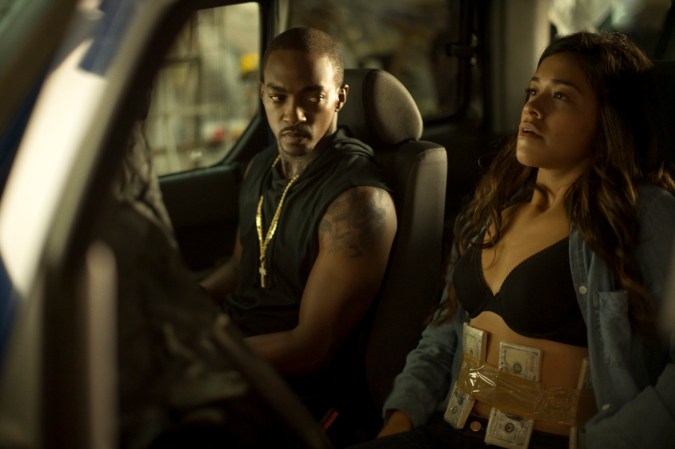Miss Bala is not a cartel film. So Gina Rodriguez tells me upfront when I ask her how this remake of the 2011 Mexican film of the same name, is different than the various other cartel films that have made their way onto the big screen as of late. “It is a movie of identity,” she clarifies. “Of finding your power. Of fulfilling your own destiny.” There is a drug cartel at the center of it — Rodriguez’s character Gloria, after all, gets embroiled in that world when she crosses the border into Tijuana and is kidnapped by a drug kingpin — but the focus, the Jane the Virgin actress stresses, is on Gloria’s transformation from an ordinary woman to an extraordinary one.
That’s precisely what drew Rodriguez to the project. As she showed in last year’s Annihilation, the Golden Globe winner is eager to take on parts that feel different from Jane Villanueva. Ones which let her embrace one of her favorite genres: action. The prospect of shepherding an American remake of such a trailblazing Mexican film — one of the first to tackle cartels in unflinching ways — was just as appealing. Hollywood could have easily turned the Miss Bala property into the kind of narco narrative that right-wing propagandists so often use to justify their bigoted views. “Instead of whitewashing it,” she says, “our community got to remake it, got to reimagine it.” In-demand, Mexico-born screenwriter Gareth Dunnet-Alcocer centered the project on a bicultural Latina, who learns how to survive after being kidnapped by a drug cartel (run by the smooth-talking Lino, played by Ismael Cruz Córdova) and forced to smuggle drugs across the borders.
Pablo Cruz, who produced the original film and serves as a producer on this newer remake, spoke at length with Remezcla during a set visit where we got to see Rodriguez in action as Gloria, on a set made to look like a replica of the border. In the years since Stephanie Sigman wowed audiences as Laura Guerrero, narco culture has gone mainstream, Cruz told us. “As a culture, we have managed to embrace the fact that this is part of our reality. When we made Miss Bala we were very careful. We couldn’t glorify narcos, those guys are crazy! But then, a series called Narcos already happened,” he joked. To ignore it would be unwise. For him, narcos and cartels in Mexico now belong to a similar pop cultural echelon as Italian mobs in New York City. He cites similar examples when pushing back against the notion that a film like this newer Miss Bala is merely perpetuating a bad image of Mexico. “When you watch Heat, that doesn’t make you want to go to Los Angeles any less!” If anything, he told Remezcla, Tijuana should take pride in knowing this project will be seen all over the world.
Looking around that day’s setting – the US-Mexico border that Gloria has to cross as a begrudging drug mule – was to see a bustling location where the bicultural identity at the heart of Miss Bala was crystal clear. Directed by Catherine Hardwicke, who grew up in McAllen steeped in Texas border life, the film plays up the ways Gloria is called a “pocha” in Tijuana, but is just as easily branded as a Mexican when apprehended in the US by the DEA. That in-between feeling is all too familiar to Rodriguez, whose Spanish is just as rudimentary as Gloria’s but who’s also often tasked to speak to and about an entire community of Latinos.
“Nobody knows the difference between any of us. If you are a Latina in America you are a Mexican, plainly,” the actress of Puerto Rican descent told us in between that sun-soaked shoot at the border. “And I felt like I needed to get closer to this culture that I represent when I go on stage or screen, regardless.” Shooting Miss Bala, which sees her mastering guns, killing it at beauty pageants, and even playing quite steamy scenes opposite Ismael’s Lino, was Rodriguez’s chance to get to know and work in Mexico on the kind of set she could never have envisioned.

“I’ve never been on a set where two languages are being spoken. Everybody as far as the eye could see had some Latino background, whether it was Argentinean or Colombian or Mexican or Puerto Rican or Cuban or Dominican or Venezuelan. We were so diverse in front [of] and behind the camera. It was just so surreal.” She says the crew was 95% Mexican (and her own stunt-woman was Puerto Rican), which made the entire proceedings unlike anything she’d experienced before. “I just felt vastly different walking into that set than I have on any other set. I felt like I was walking into a family reunion.”
She’s most proud of the fact that this high action project is Latino through and through. “We own all of it. We come in different shades. We aren’t just the bad faces. We aren’t just the good faces. We are the in-between. We are the flawed. We are the flawless. We are all of it. I knew it was going to be controversial. But this has been a spectacular experience.”
“We created an incredibly fun, entertaining action movie,” she adds. “We’re showing the world that we are able to create this for the Hollywood market.” Just don’t go calling it a cartel film.
Further reporting for this piece was done by Maurice de la Falaise
Miss Bala opens February 1st, 2019




